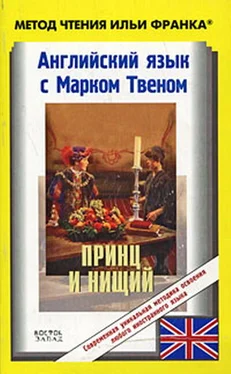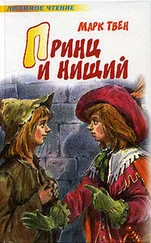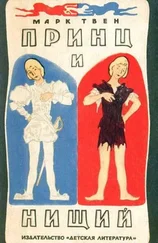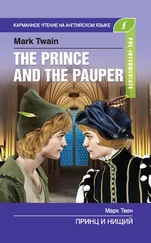Mark Twain - Английский язык с Марком Твеном. Принц и нищий (Mark Twain. The Prince and the Pauper)
Здесь есть возможность читать онлайн «Mark Twain - Английский язык с Марком Твеном. Принц и нищий (Mark Twain. The Prince and the Pauper)» — ознакомительный отрывок электронной книги совершенно бесплатно, а после прочтения отрывка купить полную версию. В некоторых случаях можно слушать аудио, скачать через торрент в формате fb2 и присутствует краткое содержание. Жанр: Сказка, на английском языке. Описание произведения, (предисловие) а так же отзывы посетителей доступны на портале библиотеки ЛибКат.
- Название:Английский язык с Марком Твеном. Принц и нищий (Mark Twain. The Prince and the Pauper)
- Автор:
- Жанр:
- Год:неизвестен
- ISBN:нет данных
- Рейтинг книги:3 / 5. Голосов: 1
-
Избранное:Добавить в избранное
- Отзывы:
-
Ваша оценка:
- 60
- 1
- 2
- 3
- 4
- 5
Английский язык с Марком Твеном. Принц и нищий (Mark Twain. The Prince and the Pauper): краткое содержание, описание и аннотация
Предлагаем к чтению аннотацию, описание, краткое содержание или предисловие (зависит от того, что написал сам автор книги «Английский язык с Марком Твеном. Принц и нищий (Mark Twain. The Prince and the Pauper)»). Если вы не нашли необходимую информацию о книге — напишите в комментариях, мы постараемся отыскать её.
Английский язык с Марком Твеном. Принц и нищий (Mark Twain. The Prince and the Pauper) — читать онлайн ознакомительный отрывок
Ниже представлен текст книги, разбитый по страницам. Система сохранения места последней прочитанной страницы, позволяет с удобством читать онлайн бесплатно книгу «Английский язык с Марком Твеном. Принц и нищий (Mark Twain. The Prince and the Pauper)», без необходимости каждый раз заново искать на чём Вы остановились. Поставьте закладку, и сможете в любой момент перейти на страницу, на которой закончили чтение.
Интервал:
Закладка:
'Noise? I heard only the wind.'
'Mayhap it was. Yes, doubtless that was it. I have been hearing it faintly all the — there it is again! It is not the wind! What an odd sound! Come, we will hunt it out!'
Now, the king's joy was nearly insupportable. His tired lungs did their utmost — and hopefully, too — but the sealed jaws and the muffling sheepskin sadly crippled the effort. Then the poor fellow's heart sank, to hear the hermit say:
'Ah, it came from without — I think from the copse yonder. Come, I will lead the way.'
The king heard the two pass out talking; heard their footsteps die quickly away — then he was alone with a boding, brooding, awful silence.
It seemed an age till he heard the steps and voices approaching again — and this time he heard an added sound — the trampling of hoofs, apparently. Then he heard Hendon say:
'I will not wait longer. I cannot wait longer. He has lost his way in this thick wood. Which direction took he? Quick — point it out to me.'
'He — but wait; I will go with thee.'
'Good — good! Why, truly thou art better than thy looks. Marry, I do think there's not another archangel with so right a heart as thine. Wilt ride? Wilt take the wee donkey that's for my boy, or wilt thou fork thy holy legs over this ill-conditioned slave of a mule that I have provided for myself? — and had been cheated in, too, had he cost but the indifferent sum of a month's usury on a brass farthing let to a tinker out of work.'
'No — ride thy mule, and lead thine ass; I am surer on mine own feet, and will walk.'
'Then, prithee, mind the little beast for me while I take my life in my hands and make what success I may toward mounting the big one.'
Then followed a confusion of kicks, cuffs, tramplings and plungings, accompanied by a thunderous intermingling of volleyed curses, and finally a bitter apostrophe to the mule, which must have broken its spirit, for hostilities seemed to cease from that moment.
With unutterable misery the fettered little king (с невыразимым страданием связанный маленький король; to utter — издавать звук; произносить; излагать, выражать словами) heard the voices and footsteps fade away and die out (слышал, как голоса и шаги стихают и замирают; to hear — слышать). All hope forsook him now for the moment (вся надежда оставила его теперь на это время; to forsake — оставлять, покидать), and a dull despair settled down upon his heart (и унылое отчаяние водворилось в его сердце). 'My only friend is deceived (мой единственный друг обманут) and got rid of (и от него отделались; to get rid of — отделаться от кого-либо),' he said (он сказал); 'the hermit will return and (отшельник вернется и) —' He finished with a gasp (он закончил со вздохом); and at once fell to struggling so frantically with his bonds again (и сразу же принялся бороться так неистово со своими путами снова; to fall to — приниматься что-то делать: «упасть к»), that he shook off the smothering sheepskin (что он стряхнул прочь удушающую овечью шкуру; to shake — трясти).
And now he heard the door open (и вот он услышал, как дверь открывается; to hear — слышать)! The sound chilled him to the marrow (этот звук пробрал его до мозга костей; to chill — леденить; marrow — сущность, костный мозг) — already he seemed to feel (уже он, казалось, чувствовал; to seem — казаться) the knife at his throat (нож у своего горла). Horror made him close his eyes (ужас заставил его закрыть глаза; to make — делать, заставлять); horror made him open them again (ужас заставил его открыть их снова) — and before him stood John Canty and Hugo (и перед ним стояли Джон Кэнти и Хьюго; to stand — стоять)!
He would have said (он бы сказал; to say — сказать) 'Thank God (слава Богу)!' if his jaws had been free (если бы его челюсти были свободны).
A moment or two later his limbs were at liberty (моментом или двумя = секундой-другой позже его конечности были на свободе), and his captors (а его похитители), each gripping him by an arm (каждый схвативший его за руку), were hurrying him with all speed through the forest (поторапливали его на всей = полной скорости через лес).
deceive [dı`si:v], limb [lım], hurry [`hArı]
With unutterable misery the fettered little king heard the voices and footsteps fade away and die out. All hope forsook him now for the moment, and a dull despair settled down upon his heart. 'My only friend is deceived and got rid of,' he said; 'the hermit will return and —' He finished with a gasp; and at once fell to struggling so frantically with his bonds again, that he shook off the smothering sheepskin.
And now he heard the door open! The sound chilled him to the marrow — already he seemed to feel the knife at his throat. Horror made him close his eyes; horror made him open them again — and before him stood John Canty and Hugo!
He would have said 'Thank God!' if his jaws had been free.
A moment or two later his limbs were at liberty, and his captors, each gripping him by an arm, were hurrying him with all speed through the forest.
CHAPTER XXII (Глава двадцать вторая)
ONCE more 'King Foo-foo the First' was roving with the tramps and outlaws (опять «король Фу-фу Первый» скитался с бродягами и изгоями), a butt for their coarse jests (мишень для их грубых насмешек) and dull-witted railleries (и тупоумных шуток), and sometimes the victim of small spitefulnesses (и иногда жертва небольших издевательств; spiteful — злобный, злой, злорадный, недоброжелательный, язвительный) at the hands of Canty and Hugo (от рук Кэнти и Хьюго) when the Ruffler's back was turned (когда спина Атамана была повернута = когда Атаман стоял к ним спиной). None but Canty and Hugo really disliked him (никто кроме Кэнти и Хьюго на самом деле не ненавидел его; to dislike — не любить). Some of the others liked him (некоторые другие любили его), and all admired his pluck and spirit (и все восхищались его отвагой и духом). During two or three days (в течение двух или трех дней), Hugo, in whose ward and charge the king was (Хьюго, на чьем попечении и заботе король находился), did what he covertly could (делал то, что он тайком мог) to make the boy uncomfortable (чтобы доставить мальчику неудобства; uncomfortable — испытывающий неудобства); and at night (а по ночам), during the customary orgies (во время обычных оргий), he amused the company by putting small indignities upon him (он развлекал компанию тем, что подвергал маленьким оскорблениям его; to put — ставить, класть) — always as if by accident (всегда как будто бы случайно: «по случаю»). Twice he stepped upon the king's toes (дважды он наступал королю на пальцы на ногах; toe — палец на ноге) — accidentally (случайно) — and the king, as became his royalty (а король, как подобало его королевскому сану; to become — подходить, идти), was contemptuously unconscious of it (был презрительно незамечающим это = не замечал) and indifferent to it (и безразличен к этому); but the third time Hugo entertained himself in that way (но в третий раз, когда Хьюго развлек себя таким образом), the king felled him to the ground with a cudgel (король сбил его на землю дубиной), to the prodigious delight of the tribe (к непомерному веселью шайки). Hugo, consumed with anger and shame (Хьюго, объятый злостью и стыдом; to consume — потреблять, пожирать, снедать), sprang up (подскочил; to spring — вскакивать; up — вверх), seized a cudgel (схватил дубину), and came at his small adversary in a fury (и напал на своего маленького врага в ярости; to come at — напасть: «прийти на»). Instantly a ring was formed around the gladiators (тотчас кольцо было образовано вокруг гладиаторов), and the betting and cheering began (и ставки и аплодисменты начались; to cheer — приветствовать, ободрять, аплодировать). But poor Hugo stood no chance whatever (но бедный Хьюго не стоял = не имел никакого шанса вообще; to stand — стоять). His frantic and lubberly 'prentice-work (его неистовая и неуклюжая ученическая работа; prentice = apprentice — подмастерье, ученик) found but a poor market for itself (нашла только бедный рынок для себя = не нашла себе успешного применения; to find — найти) when pitted against an arm (когда = будучи противопоставленной против руки; to pit — складывать, стравливать, противопоставлять) which had been trained by the first masters of Europe (которая была натренирована первейшими мастерами Европы) in single-stick, quarter-staff (в сингл-стике, квотерстаффе = во владении ими), and every art and trick of swordsmanship (и каждой хитрости и трюку = и всем тонкостям фехтовального искусства). The little king stood (маленький король стоял; to stand — стоять), alert but at graceful ease (начеку, но в изящной непринужденности = непринужденно), and caught and turned aside (и улавливал и отводил в сторону; to catch — ловить; to turn — поворачивать) the thick rain of blows (проливной дождь = град ударов; thick — толстый) with a facility and precision (с легкостью и точностью) which set the motley onlookers wild with admiration (чтó сделало разнообразных наблюдателей дикими от восхищения; to set — устанавливать); and every now and then (и постоянно: «каждое сейчас и тогда»), when his practised eye detected an opening (когда его натренированный глаз замечал щель = уязвимое место), and a lightning-swift rap upon Hugo's head followed as a result (и молниеносный удар по голове Хьюго следовал как результат = в результате), the storm of cheers and laughter (буря ободряющих криков и хохота) that swept the place (которая охватывала место = место действия; to sweep — мести, охватывать) was something wonderful to hear (была чем-то чудесным, чтобы услышать = для слуха). At the end of fifteen minutes (в конце 15 минут = через 15 минут), Hugo, all battered, bruised (Хьюго, весь избитый, в синяках; to bruise — ставить синяки), and the target for a pitiless bombardment of ridicules (и (ставший) мишенью для безжалостной бомбардировки насмешками) left the field (покинул поле (боя); to leave — покидать); and the unscathed hero of the fight (а невредимый герой этой битвы) was seized and borne (был схвачен и понесен; to bear — носить) aloft upon the shoulders of the joyous rabble (наверху на плечах радостной толпы) to the place of honor beside the Ruffler (к месту почета = почетному месту рядом с атаманом), where with vast ceremony (где с грандиозной церемонией) he was crowned King of the Game-Cocks (он был коронован Королем Боевых петухов); his meaner title being at the same time solemnly canceled and annulled (его более неприглядный титул будучи = был в то же время торжественно отвергнут и аннулирован), and a decree of banishment from the gang pronounced against any (и указ об исключении из шайки (был) произнесен против кого-либо) who should henceforth utter it (кто с этого времени произнес бы его).
Читать дальшеИнтервал:
Закладка:
Похожие книги на «Английский язык с Марком Твеном. Принц и нищий (Mark Twain. The Prince and the Pauper)»
Представляем Вашему вниманию похожие книги на «Английский язык с Марком Твеном. Принц и нищий (Mark Twain. The Prince and the Pauper)» списком для выбора. Мы отобрали схожую по названию и смыслу литературу в надежде предоставить читателям больше вариантов отыскать новые, интересные, ещё непрочитанные произведения.
Обсуждение, отзывы о книге «Английский язык с Марком Твеном. Принц и нищий (Mark Twain. The Prince and the Pauper)» и просто собственные мнения читателей. Оставьте ваши комментарии, напишите, что Вы думаете о произведении, его смысле или главных героях. Укажите что конкретно понравилось, а что нет, и почему Вы так считаете.




![Марк Твен - Принц и нищий [Издание 1941 г.]](/books/148799/mark-tven-princ-i-nichij-izdanie-1941-g-thumb.webp)







